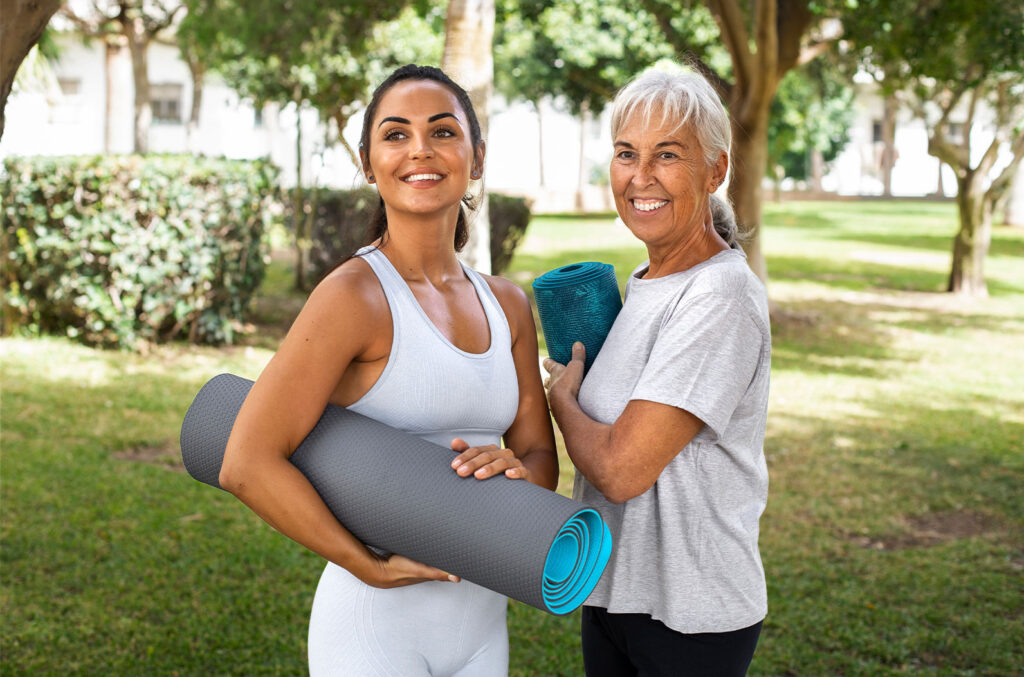Women's Health
Can Exercising Help You During Menopause
Your body will likely undergo several changes throughout menopause. During this time, it is often suggested to take stock of how you feel and the activities that may improve your stress levels and overall health. If you haven’t already, now is a good time to implement an exercise routine. While exercise has not improved certain symptoms of menopause, such as sleep issues or hot flashes, it may help with other concerns. You may be wondering how exercise impacts your health, especially during this time, and what you can do to incorporate exercise into your daily life. Let’s take a closer look at understanding the positive impacts that exercise can have during menopause as well as some additional tips.

Reduces Stress
You may notice that you experience more stress and anxiety as your body goes through the many changes during menopause. Some studies suggest that exercise can help reduce symptoms of anxiety and depression due to the release of endorphins, also known as the “feel good” neurotransmitters.
Reduces Weight Gain
As the production of estrogen slows during menopause, it’s not unusual for women to experience weight gain, especially in the abdominal area. Regular exercise can help combat this weight gain, reduce body mass index (BMI), and improve overall health.
Reduces Bone Loss
Exercising consistently can strengthen your bones and slow bone loss. Ultimately this means there is less chance of osteoporosis and broken bones.
What Kind of Exercise Should You Do?
A general guideline for women is participating in at least 150 minutes of weekly aerobic activity. Those kinds of activities may include running, biking, swimming, or water aerobics. It is also recommended to include at least two days of strength training exercises, such as using strength training machines or free weights. Stretching and stability, and balance exercises can also be a great way to improve flexibility and help yourself avoid falls. Yoga may be a good fit for you if you’re trying to increase flexibility and balance.
Tips for Starting an Exercise Routine
If you’re new to exercise but want to start a routine to help you stay healthy during menopause, you may be searching for ways to get started and stay motivated. Here are a few quick tips to consider:
- Choose activities that you enjoy. If you already know you don’t enjoy running, perhaps consider a different aerobic activity. Avoid exercise routines that you dread because it means you’ll be more likely to stick with them. Instead, consider which activities you enjoy the most and create a workout routine centered on them.
- Invite a friend. Working out doesn’t have to be a lonely experience. Perhaps you have a friend who wants to exercise, too. Having a workout partner increases motivation and provides support when you need it the most.
- Consider taking a class. Sometimes it can feel intimidating to enter a gym or start an exercise routine without experience. An exercise class not only brings a social element to it, but it’s also a great way to learn the proper form for certain moves.
- Build a home gym. It may not be time or cost-effective for some people to go to a gym. Building a home gym in your garage or other unused space may be more convenient. The great thing about it is that you can make it as elaborate or as simple as you’d like. Some people have a variety of machines, while others start with a few free weights and stretching cables.
- Set realistic goals. It’s not uncommon for people to create elaborate goals during the excitement of starting something new. However, you should remember that setting small, achievable goals is important, so you don’t get burnt out. Try setting smaller goals and then reevaluate those goals as you gain more fitness.
- Remember that physical activity doesn’t have to be a structured exercise class. Some people exercise daily by walking around their neighborhood, dancing, or working in the yard. Consider getting creative with your exercise routine so that you enjoy what you’re doing.
Menopause certainly brings significant life changes, but you can still take control of your health by implementing an exercise routine into your daily life. Doing so can help you feel better, maintain a healthy weight, and improve your mental health. When you think of starting an exercise routine, it’s important to be as consistent as possible. Before starting any new exercise program, you should also talk to your doctor to ensure it fits your needs well.
Resources:
Fitness tips for menopause (MAYO CLINIC).
Why You Should Exercise Your Way Through Menopause – Penn Medicine Lancaster General Health
Like? Share with your friends
Learn more information on how Warmi can offer you full spectrum benefits for menopause*

